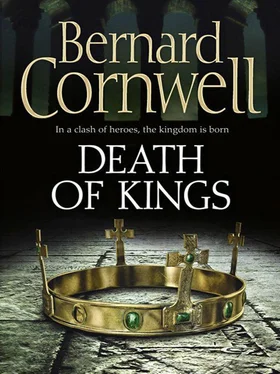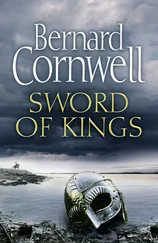‘Maybe the bastards want us to attack them?’ Finan suggested. ‘Then close on us from either side?’
‘They know we won’t attack,’ I said. We were fewer in number and most of our men were not trained warriors. The Danes would know that, simply because the fyrd was rarely equipped with shields. They would see my shield wall at the centre of our line, but on either side, that shield wall was flanked by men carrying no protection. Easy meat, I thought, and I did not doubt the fyrd would break like a twig when the Danes advanced.
Except they stayed between the trees as the mist vanished and the rain thickened. At times the Danes beat swords against shields to make the war-thunder, and I half heard men shouting, though they were too far away to hear the words. ‘Why don’t they come?’ Finan asked plaintively.
I could not answer because I had no idea what the Danes were doing. They had us at their mercy and they were standing instead of charging. They had advanced so slowly the previous day, now they were immobile, and this was their great invasion? I remember staring at them, wondering, and two swans flew overhead, wings beating the rain. A sign, but what did it mean? ‘If they kill us to the last man,’ I asked Finan, ‘how many of them will die?’
‘Two hundred?’ he guessed.
‘That’s why they’re not attacking,’ I suggested and Finan looked at me, puzzled. ‘They’re hiding men in the trees,’ I said, ‘not in hope we attack, but so we don’t know how many they are,’ I paused, sensing an idea taking shape in my mind, ‘or more accurately,’ I went on, ‘how few they are.’
‘Few?’ Finan asked.
‘This isn’t their great army,’ I said, suddenly sure of it. ‘This is a feint. Sigurd’s not there, nor is Cnut.’ I was guessing, but it was the only explanation I could find. Whoever commanded these Danes had fewer than a thousand men and did not want to lose two or three hundred in a fight that was not part of the main invasion. His job was to hold us here and draw other Saxon troops to the valley of the Sæfern, while the real invasion came. From where? From the sea?
‘I thought Offa told you…’ Finan began.
‘That bastard was crying,’ I said savagely, ‘he was weeping to convince me that he spoke the truth. He told me he was repaying my kindness, but I was never kind to him. I paid him, just like everyone else. And the Danes must have paid him more to tell me a pack of lies.’ Again I did not know whether that was true, but why were these Danes not coming to slaughter us?
Then there was movement in the centre of their line and the shields parted to let three horsemen through. One carried a leafy branch, a sign that they wanted to talk, while another wore a high, silver-crested helmet from which trailed a plume of raven feathers. I called to Merewalh, then walked with him and Finan past our feeble barrier and across the wet grassland towards the approaching Danes.
Haesten was the man in the raven-plumed helmet. It was a magnificent piece of workmanship, decorated by the Midgard serpent that twisted around the crown, its tail protecting the nape of his neck while the mouth formed the crest that held the raven plumes. The cheek-pieces were incised with dragons, between which Haesten’s face grinned at me. ‘The Lord Uhtred,’ he said happily.
‘You’re wearing your wife’s bonnet,’ I said.
‘It was a gift from the Jarl Cnut,’ he said, ‘who will be here by nightfall.’
‘I wondered why you were waiting,’ I said, ‘now I know. You need help.’
Haesten smiled as if he indulged my insults. The man with the green branch was a few paces behind him, while next to him was a warrior wearing another ornate helmet, this one with its cheek-pieces laced together so I could not see his face. His mail was expensive, his saddle and belt decorated with silver, and his arms thick with precious rings. His horse was nervous and he struck it hard on the neck, which only made it sidestep in the soft ground. Haesten leaned over and stroked the skittery stallion. ‘Jarl Cnut is bringing Ice-Spite,’ he said to me.
‘Ice-Spite?’
‘His sword,’ Haesten explained. ‘You and he, Lord Uhtred, will fight in the hazel branches. That’s my gift to him.’
Cnut Ranulfson was reputed to be the greatest swordsman among all the sword-Danes, a magician with a blade, a man who smiled as he killed and was proud of his reputation. I confess I felt a tremor of fear at Haesten’s words. A fight contained in a space marked by hazel branches was a formal fight, and always to the death. It would be a demonstration of skill by Cnut. ‘It will be a pleasure killing him,’ I said.
‘But didn’t your angels say you were to die?’ Haesten asked, amused.
‘My angels?’
‘A clever idea,’ Haesten said, ‘young Sigurd here brought them back to us. Two such pretty girls! He enjoyed them! So did most of our men.’
So the horseman with Haesten was Sigurd’s son, the puppy who had wanted to fight me at Ceaster, and the raid on Turcandene had been his doing, his initiation as a leader, though I did not doubt his father had sent older and wiser men to make sure his son made no fatal errors. I remembered the flies around Ludda’s body and the crudely drawn raven on the Roman plaster. ‘When you die, puppy,’ I told him, ‘I’ll make sure you have no sword in your hand. I’ll send you to Hel’s rotten flesh instead. See how you enjoy that, you dribble of bat shit.’
Sigurd Sigurdson drew his sword, he drew it very slowly as if to demonstrate that he was not issuing an immediate challenge. ‘She is called Fire-Dragon,’ he said, holding the blade upright.
‘A puppy’s blade,’ I scoffed.
‘I want you to know the name of the sword that will kill you,’ he said, then wrenched his stallion’s head around as if to drive the beast into me, but the horse half reared and young Sigurd had to cling to the mane to stay in the saddle. Haesten again leaned over and took hold of the stallion’s bridle.
‘Put the sword away, lord,’ he told the boy, then smiled at me. ‘You have till evening to surrender,’ he said, ‘and if you do not surrender,’ his voice was harder now, riding over the comment I had been about to make, ‘then every one of you will die. But if you yield, Lord Uhtred, we shall spare your men. Till evening!’ He turned his horse, dragging young Sigurd with him. ‘Till evening!’ he called again as he rode away.
This was the war that passeth understanding, I thought. Why wait? Unless Haesten so feared losing a quarter or a third of his force. But if this truly was the vanguard of a great Danish army then it had no business loitering at Scrobbesburh. They should be pushing fast and hard into the soft underbelly of Saxon Mercia, then crossing the Temes to ravage Wessex. Every day that the Danes waited now was a day to assemble the fyrd and bring house-warriors from the Saxon shires, unless my suspicion was right and this Danish thrust was intended to deceive because the real attack was taking place somewhere else.
There were more Danes nearby. Late in the morning, as the rain at last ended and a watery sun showed weak through the clouds, we saw more smoke in the eastern sky. The smoke was thin at first, but thickened fast, and within an hour two more plumes appeared. So the Danes were harrying the nearby villages, and another band had crossed the river and were patrolling the great loop that trapped us. Osferth had found two boats, just skins stretched over willow frames, and had wanted to make a big raft like the one we had found to cross the Use, but the presence of the Danish horsemen ended that idea. I ordered my men to stiffen the barricade across the neck, raising it with beams and rafters to protect the men of the fyrd and channel any attack into my shield wall. I had small hope of surviving a determined assault, but men must be kept busy and so they pulled down six of the cottages and carried the timbers to the neck where the barrier slowly became more formidable. A priest who had taken refuge in Scrobbesburh walked along my defensive line giving men small scraps of bread. They knelt before him, he placed the crumbs on their lips, then added a pinch of soil. ‘Why’s he doing that?’ I asked Osferth.
Читать дальше
Конец ознакомительного отрывка
Купить книгу












